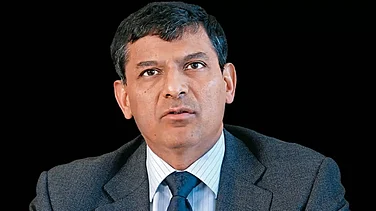A few days before Aditya Birla Group chairman Kumar Mangalam Birla stepped down as non-executive chairman of Vodafone Idea, a letter was doing the rounds. He had addressed it to the cabinet secretary, Rajiv Gauba, saying that he is willing to hand over his stake of 27% in Vodafone Idea to any entity the government picks.
KM Birla’s Vodafone-Idea Letter: Cry for Help Or Masterstroke?
As Kumar Mangalam Birla steps down making way for Himanshu Kapania to take over as non-executive chairman of Vodafone-Idea, it is time to analyse what was the real meaning of his letter to the government.

He just wanted it to be kept a “going concern”.
It seemed distressing--head of one of India’s biggest corporate groups suggesting that it has become impossible to operate in an industry and that the company wasn’t able to raise much-needed funds because of the operating environment.
What does it mean for the telecom industry when an operator with over 267.8 million subscribers (March 31, 2021) holds up its hand in surrender? Industry experts say, the largest lender a.k.a the government/public sector banks will be left holding the baby. It will be left to choose between paying a financial cost and suffering a reputational loss.?
An industry expert, who does not want to be named, believes the government will have no option but to step in. “Vodafone is going to go bust, it is an eventuality. When it happens, the government shouldn’t step in… but it is likely to,” he says. “The company cannot be allowed to go under because how can such a large subscriber base be expected to switch to another network overnight? There are also nearly ten million dependent on it as employees and vendors. Also, letting Vi down will send a bad signal to the investment community…. at Rs 477 billion, this is one of the largest FDIs.”
He believes the Birla letter should have been expected. It is not the first time, Birla is crying out in distress; after the Supreme Court’s AGR decision in late 2019, he had said that without government help in the matter, Vi will shut down. “Even if he didn’t ask the government to take over, that is what is likely to happen. He is simply asking their biggest lender, which is the government with around Rs 1.4 trillion exposure (including the spectrum fee and AGR dues), to pull him out,” he says. ?
Jaideep Ghosh, COO at Shardul Amarchand Mangaldas, who has been tracking the telecom sector for many years, too does not see the crisis ending in a duopoly, but nor does he see the government taking over. He thinks the status quo will simply remain. “As the cliché goes, it (Vodafone Idea) is too big to fail.” The size of the company and situation are reasons why he does not see outside funding easy to come by. For, it was only last year that Reliance Jio raised nearly Rs 1.2 trillion over 11 weeks.
It is a tough situation that the GoI finds itself in. Author and former CEO of P&G India, Gurcharan Das, advises prudence and learning from history. “It should be using the industry as a revenue generator,” he says, “A good example to follow would be what the Vajpayee government did about the license fee.” In 1999, the Atal Bihari Vajpayee-led government stopped charging the telcos a burdensome license fee and instead moved to a revenue-sharing agreement.?
“The government converting its debt into equity and taking over would be a dangerous thing because it cannot make a success of it in such a competitive environment. But they could try something like the Satyam resolution.” In 2009, when Ramalinga Raju sent out his resignation letter and the Satyam Computer Services scandal unfolded, the government came up with an extraordinary solution. It appointed a board and worked with private-sector participants to revive the company, which was then taken over by Tech Mahindra and renamed Mahindra Satyam.
Can Vi be merged into BSNL?
In theory, the Indian government can do that by converting its debt into equity and merging Vi with state-run BSNL. Telecom is a strategic sector for GoI, so the above hypothesis is possible. And KM Birla knows that, but the question is why will the government acquire Vi, especially at a time when GoI is trying to offload stake in PSUs.
On the other hand, Vi’s collapse is bad news for the government.
“It would be a huge failure for the government if the company collapses. It would mean that the government has failed to ensure competition in the market,” he says. Das believes that Vodafone’s leaving will be seen in conjunction with the government’s face off with Cairn Energy, over retrospective taxation and the latter trying to claim GoI’s Paris properties in lieu of an arbitration award.?
If Vi fails, the industry expert says, the competitor telcos will have spoils to share with Jio benefitting the most. “The customers are most likely to be split 60:40, with the larger share going to Jio and the higher-paying customers going to Airtel. But, Bharti Airtel will be adversely affected too, because of its exposure to Indus Towers, which earns a large part of its revenue from Vi.”
The failure will harm the reputation of the Birla group too, he says, and sour its relationships with the banks. But he does not see it as a lasting damage.
Then, was the Birla letter a cry for help or a masterstroke??

























